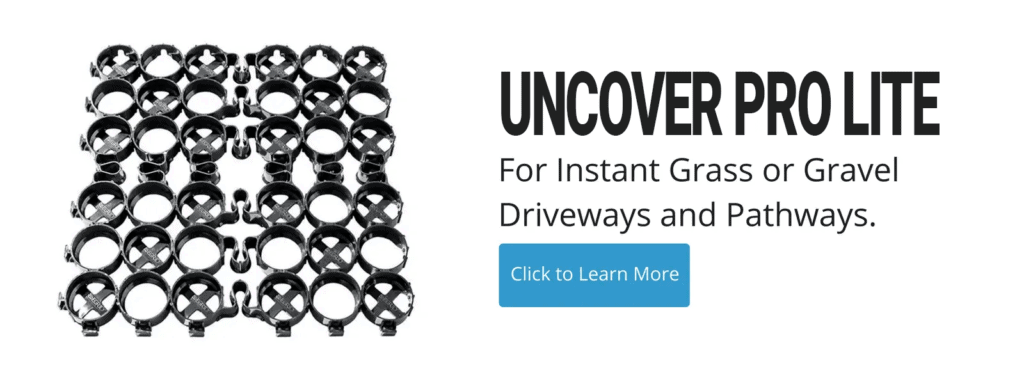A Quick Guide to Permeable Paver Patios
Patios come in all shapes and sizes, but usually serve one of a handful of purposes. They can be used for cooking, relaxing, entertaining, or all of the above. They often have furniture and other items, and because they are located outside the walls of your home, they tend to be susceptible to flooding.
Many patios are laid with some type of impermeable material, usually concrete, which doesn’t allow water to pass through it, and displaces it to the sides. If your patio is uncovered, this can lead to flooding rather quickly.
There are, however, patios that are uncovered, yet somehow immune to flooding. In case you weren’t aware of permeable paver patios, let’s go through an in-depth breakdown of what they are and how they can benefit you as well as the world at large.
What is a Permeable Patio?
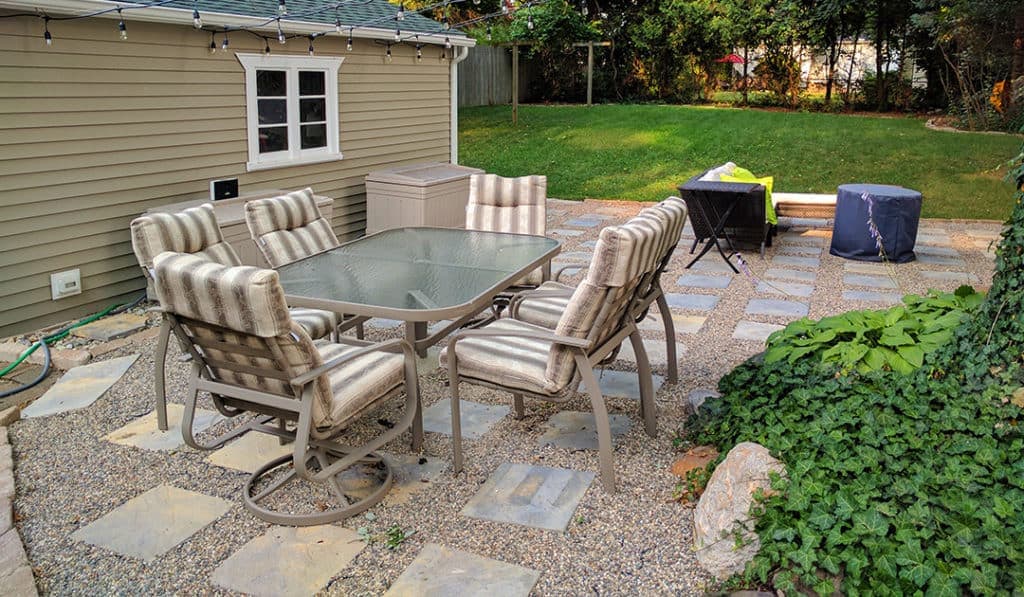
A permeable patio is a patio constructed with permeable pavers instead of more traditional paving materials like concrete. These pavers serve a variety of purposes, but the most important is to provide you with solid, level, durable paving that can stand up to the traffic your patio will get, while simultaneously preventing flooding from ever occurring near your patio, due to the built-in drainage capabilities of the pavers.
Instead of concrete being laid over a level subgrade (as patios are normally built), permeable paver patios use aggregate and pavers instead. The subgrade is excavated and a cloth is laid down over the level surface and serves as a weed block. Then, the aggregate of your choice is poured into the subgrade and rolled or tamped for a tight compaction.
Next, the pavers are laid over the aggregate and more aggregate, either different or the same type, is poured into the cells the pavers. The plastic pavers hold the fill gravel in place so there is no maintenance for this stabilized patio surface. The paver grid surface filled with aggregate is then compacted to provide a level patio. Simple, easy, DIY friendly. That’s the entire installation process of permeable paver patios in a nutshell.
Why are Permeable Patios Better?
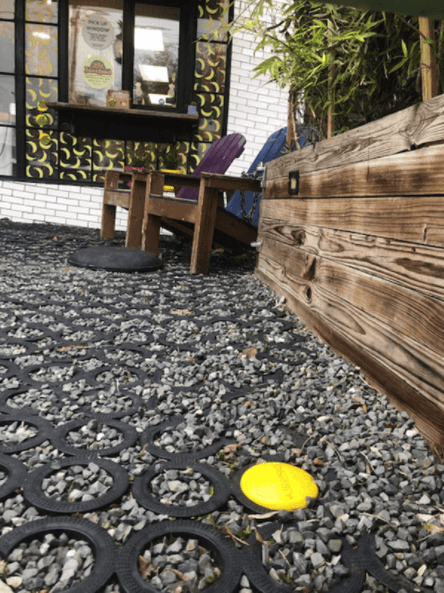
There are many reasons why permeable paver patios are the better choice. Unless you are specifically married to the look of concrete, you’re likely to be swayed by permeable paving instead. First, they perform equal to or better than solid concrete patios in terms of durability and functionality. They cost less to install and require almost no maintenance whatsoever. Perhaps more importantly, they offer a wide variety of pleasing and natural aesthetic options.
They also have a variety of style options, with different types and colors of aggregate available. You can also include some impermeable paving into the design, while your permeable pavers fill in the gaps. Examples of this include stepping stone pavers, which are plastic pavers that stabilize a stone paver in the center and contain the surrounding gravel or grass fill in between the stepping stones or rock pavers.
Another reason why a DIY permeable patio paver is the best choice is that they are much better for the environment than non-permeable materials. Not only do they allow natural water flow, certain companies make their pavers with eco-friendliness in mind. TRUEGRID is one example of a company that uses 100% post-consumer recycled plastic to make their pavers.
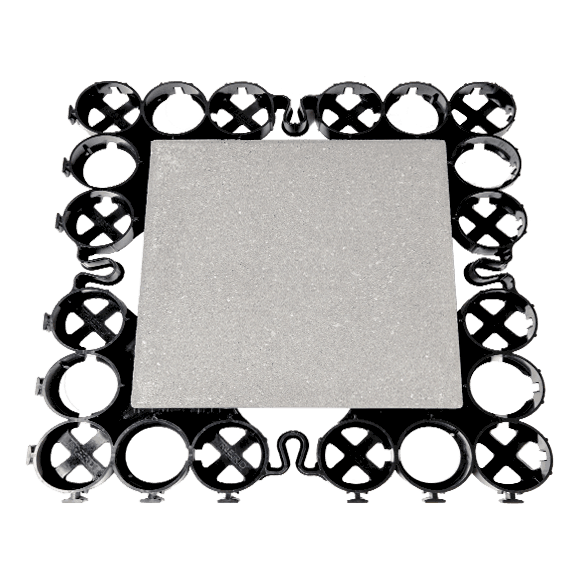
The permeable pavers from TRUEGRID are light weight despite being as strong or stronger than concrete and easy to transport and install. The DIY permeable patio you can build with their products requires no special machinery or equipment other than a heavy roller and basic excavating tools like a shovel, hoe, etc.
Why Should You Use TRUEGRID Products to Build Your Permeable Patio?

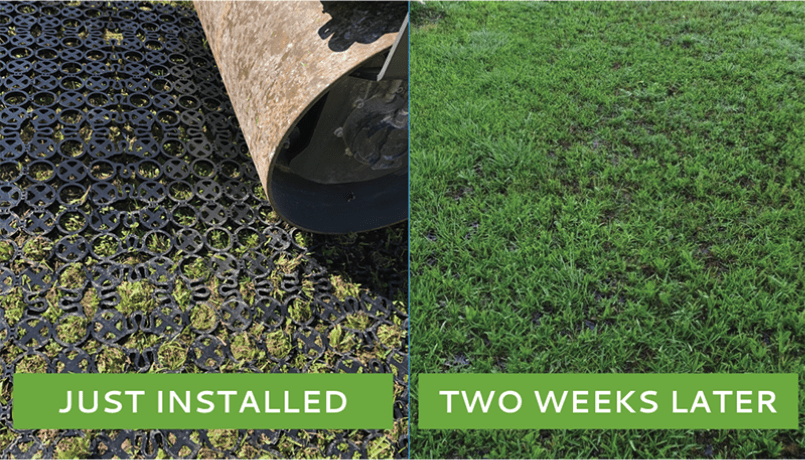
Whether you’re looking to build a residential or commercial patio, the permeable pavers from TRUEGRID will outperform nearly anything else you can find, and their proven track record of flood-prevention performance is another big plus. Some permeable pavers require special equipment or knowledge to install, but TRUEGRID products are so easy to use that you can start building a DIY permeable patio in the morning and be finished before the sun sets.
Permeable Patios are Good for Everyone
A permeable paver patio is a benefit for many reasons. They look great and natural, are cooler in hot weather than concrete, last a long time, perform better than concrete, add drainage, never pool or puddle and are far better for the environment than traditional paving. If you want a functional patio that is immune to flooding and leaves the smallest carbon footprint possible while also looking great, look no further than TRUEGRID.
Pavers are such a convenience, it’s hard to imagine living without them. Anywhere we want to frequent or travel, pavers make it much easier. Pavers serve a basic yet vital role in helping us get from point A to point B without getting too messy along the way. They provide us with a place to walk, drive, park, and more, and they also look nice as well, adding an element of organization and elegance to any area.
Pavers have been of great importance to us throughout the years, but as we’ve evolved, so too, have our pavers. No longer limited to basic options like brick, concrete, stone, and wood, we’ve developed new materials for creating pavers. Paving technology has come so far, in fact, that we can even pave entire fields while hardly impeding upon Mother Nature.
This type of pavement, which differs from impervious paving like concrete and asphalt, is called permeable pavement. Pavers created to be permeable are the solution to the biggest issue caused by impermeable pavement, water displacement.
In case you were unaware that such pavers existed, here’s a thorough overview of what permeable pavers are, how they differ from traditional pavers, and why you might want to consider using permeable pavers instead of non permeable pavers for your next project.
What’s the Difference Between Permeable Pavers and Non Permeable Pavers?

The difference is that permeable pavers are created with many holes through which water can drain directly through and into the soil below. This is much different than impermeable material, which forces water to flow over and around it, leading to erosion, flooding, and more.
The other main difference between permeable pavers and non permeable pavers is that permeable pavers are often created with eco-friendly material like recycled plastic. This plastic requires far fewer resources to source, mold, construct, transport, and install. As a result, the environmental impact of permeable pavers is almost nothing compared to that of common paving materials like concrete and asphalt. This is one of the biggest and most impressive improvements we’ve made in paving technology over recent years.
What Makes Permeable Pavers the Better Choice?
You might think that permeable pavers sound like a great alternative in some instances like residential usage, but that they might not be able to handle other types of applications. That is wrong, however. Companies like TRUEGRID and others have created permeable pavers for every situation, residential, commercial, industrial military, and more.
Residential pavers from TRUEGRID make a superior driveway paving material thanks to their cost-effectiveness, flood-prevention capabilities, durability, and versatility. With these pavers, you’re able to create a variety of driveway styles that all perform as well, if not better than your typical concrete or asphalt driveway. They also require much less maintenance and will never develop ruts, cracks, or potholes.
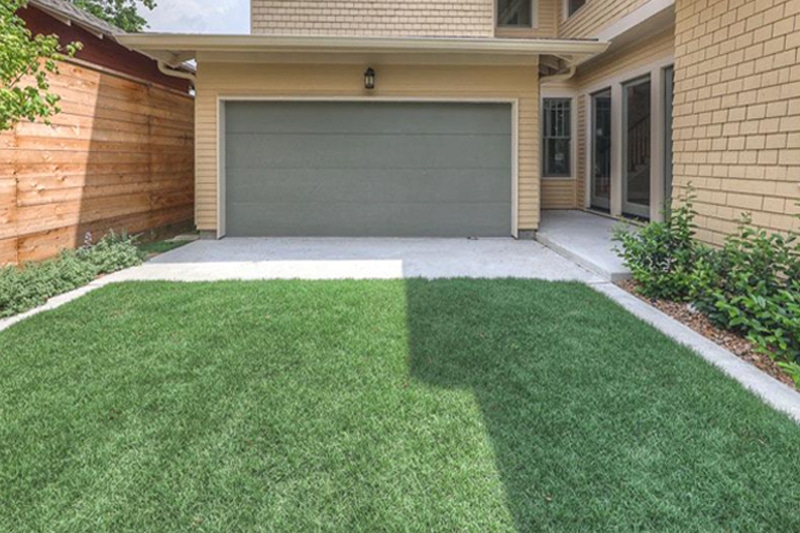
For commercial usage, permeable pavers also make a fine choice. Unlike with concrete and asphalt, you won’t need to call in a paving team to redo your parking lots every so often. TRUEGRID also has SuperSpot® parking markers available in a variety of colors, allowing you to create lot lines that will never fade or need to be repainted.
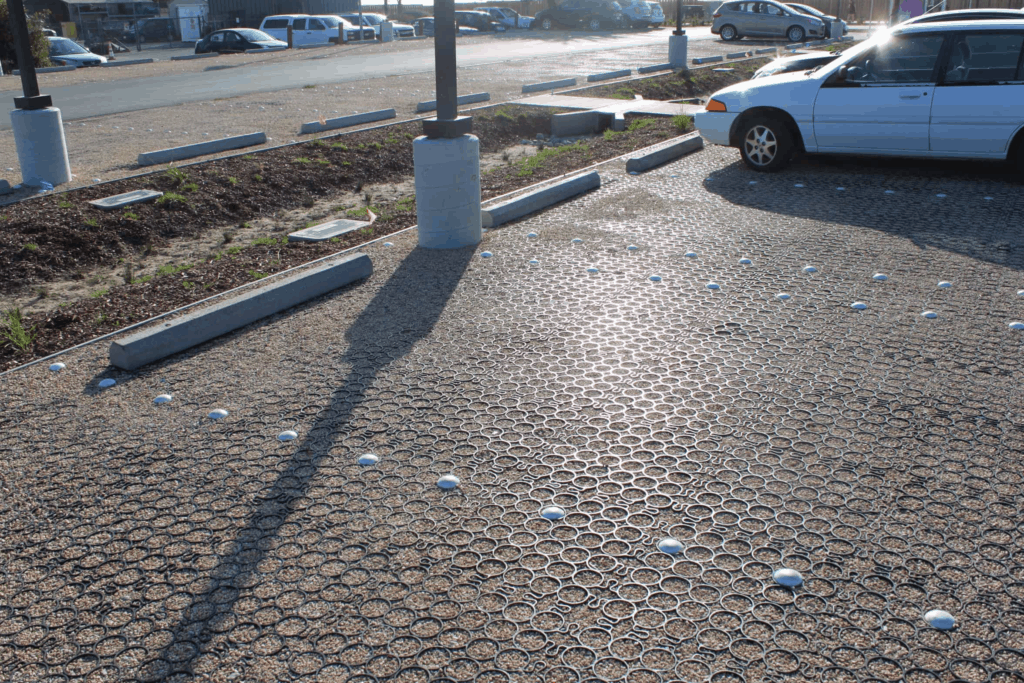
Industrial parking lots can also be created from permeable pavers, especially with products that are up to the task such as TRUEGRID MACK™ pavers. These pavers can be used to build military sites, construction sites, or any other site that calls for the highest amount of durability and strength from it’s paving.
There is No Reason to Use Impermeable Paving for Any Project
If you’re looking for a way to save time and money without sacrificing even the slightest amount of durability, functionality, style, or versatility, you need to use permeable pavers for your next project. Whether you’re looking to create an industrial-strength parking lot equipped to handle massive trucks and heavy equipment, or you just want a small, one-car driveway, permeable pavers have you covered from all angles.
You’ll never have to worry about flooding or drainage issues again with permeable pavers. Maintenance requirements will also plummet to an all-time low, which is especially helpful if you’re running a commercial business that gets a lot of traffic.
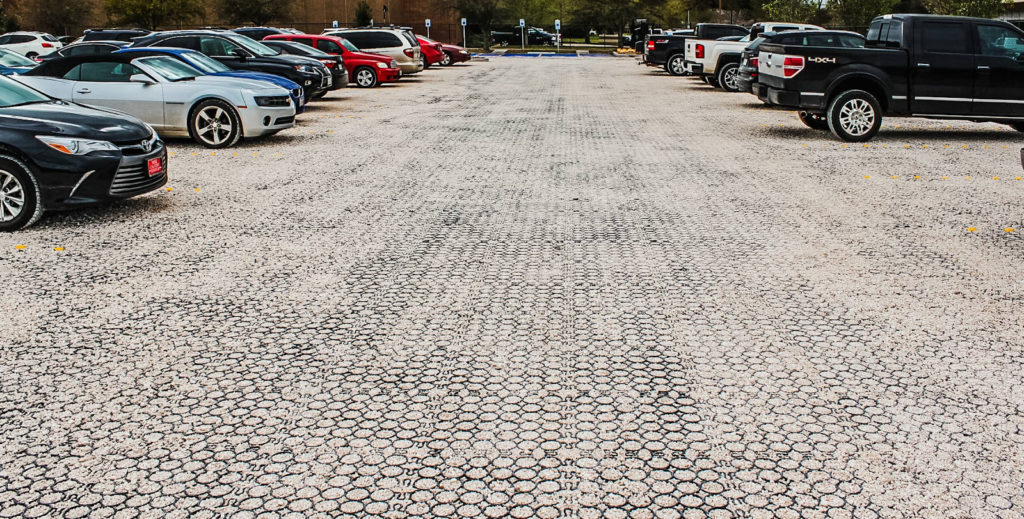
The aesthetic look of permeable paving in any setting is guaranteed to leave you pleased, with multiple color and style options available to suit any taste. Plus, you can even get tax credits in some areas for installing permeable paving. When you add up all the benefits of using permeable pavers instead of non permeable pavers, it’s hard to see why anyone would continue to use impermeable paving when there’s such a cost-effective and superior option available.
For all your permeable paver needs contact TRUEGRID to discuss your project.
Nowadays, it’s not enough to have a basic asphalt or concrete driveway. With so many other driveway paving options available, it’s no surprise that a large percentage of homeowners are looking to or already have migrated away from concrete and asphalt as a means of paving their driveways.
Pavers are the next best thing in terms of driveway paving, but with so many different types and styles to choose from, it can be downright intimidating to even begin looking. If you’re a homeowner looking to replace your driveway or install a new one soon, let’s run through the best pavers for driveway use.
1. What Kind of Pavers Do You Want?
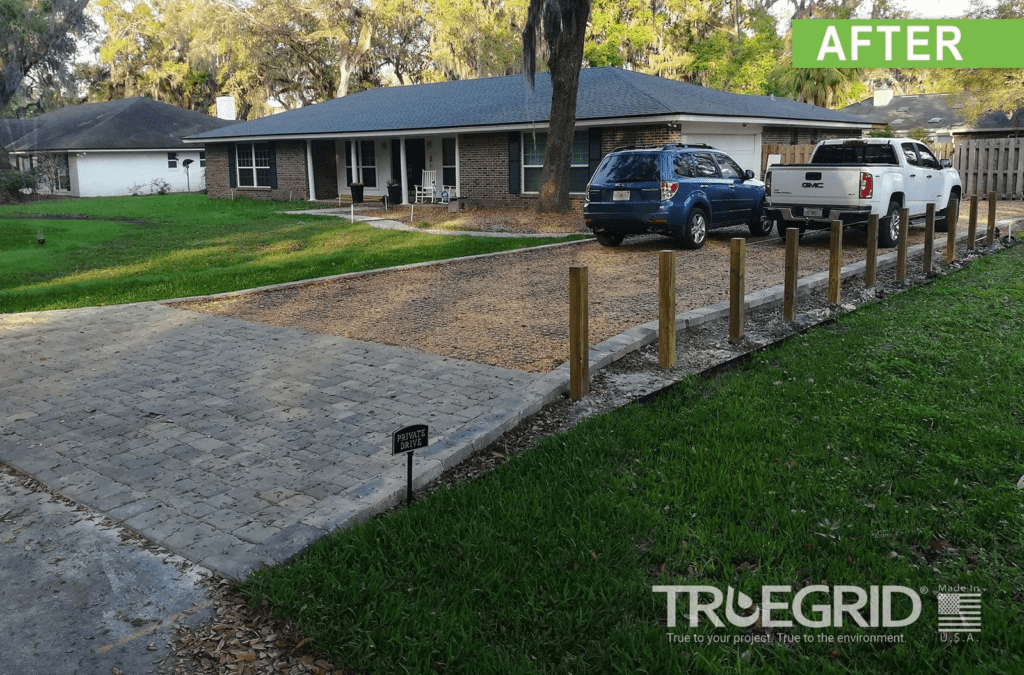
The first thing to consider when contemplating the best pavers for driveway use is what kind of pavers you want. There are many different types, each with unique pros and cons that may or may not be suited for your particular interests. The most common types of pavers include brick, concrete, cobblestone, rubber, porcelain, marble, travertine, bluestone, flagstone, and plastic.
What are your top goals for the driveway? What paver system has the best drainage to protect your home from flooding? What system will last longest with the least maintenance? What will improve the appearance and curb appeal of your home? How can you save money?
Brick is great for aesthetic appeal and stylistic diversity. Brick pavers tend to be eco-friendly but can be easily damaged and worn down. They also require frequent maintenance to be performed if they are to stay in good shape. Installation is labor intensive and expensive.
Concrete pavers are also stylistically diverse and easy to install. They do, however, experience color fade over time and can crack during extreme temperature fluctuations. They may be expensive and are considered high-maintenance.
Bluestone has a uniquely beautiful blue color while also being durable. It’s easy to accidentally purchase fake bluestone, though, and the authentic stuff is incredibly expensive. Flagstone is non-slip and lasts longer than concrete pavers. They are sourced naturally, however, making design and cost much more of an issue than with other types of driveway pavers.
Porcelain, cobblestone, marble, and travertine are all great for aesthetics, but incredibly easy to damage and don’t hold up for everyday driveway use. Rubber pavers can be durable but lack style and are not very eco-friendly either. Gravel or grass filled plastic pavers are the most durable type available and have a variety of styles to choose from. They are the most eco-friendly pavers since they are sourced from 100% recycled plastic.
2. What Type of Driveway Do You Want?
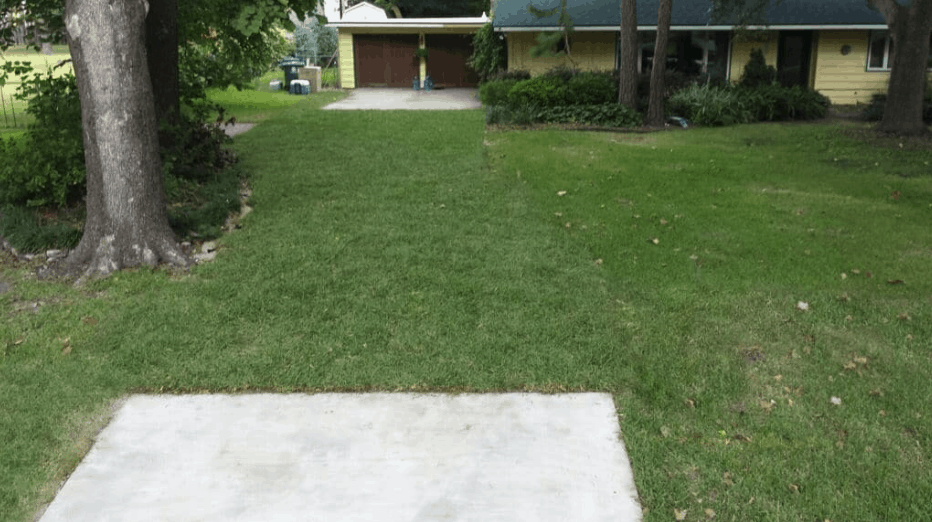
Is drainage important? Do you wish added protection to keep water away from your home? This is in reference to either an impermeable driveway or a permeable one. A permeable driveway allows water to drain right through it, while an impermeable one does not. If you have a driveway that is prone to flooding or erosion, this type of driveway will eliminate those water damage problems when installed with a drainage rock base. You can even have some type of heating system installed beneath your permeable paver driveway to prevent the buildup of snow or ice, which already melts and dissolves faster than an asphalt or concrete driveway. Snow plowing is no problem in cold climates.
3. Miscellaneous Factors
This is where the rest of your considerations will come into play. Cost-effectiveness, eco-friendliness, maintenance, durability, curb appeal, and local regulations and incentives should all be considered. TRUEGRID permeable pavers are by far the most cost-effective method and one of the best driveway pavers available. They are built, transported, and installed with eco-friendliness as a top priority, and the installation time is next to nothing.
The time and effort it takes to install a permeable paver driveway with TRUEGRID products is so much less compared to a hardscape, in fact, that you could even complete the installation on your own in a single day and have your family help you out as a DIY project.
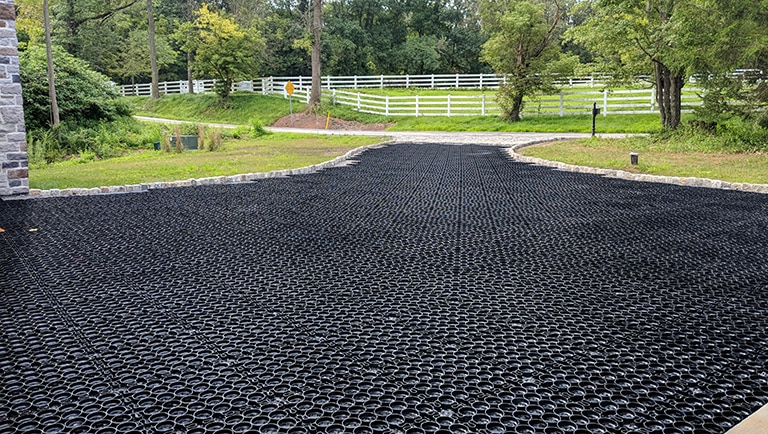
Pavers are also more durable than any other type of stone or impermeable material, and can even boost your curb appeal depending on how you choose to install them and in what style/color. There are tax incentives available for some areas as a reward for installing these environmentally-friendly pavers, so check your local regulations to see if you qualify.
The Right Pavers Can Make or Break Your Driveway

Solid concrete and asphalt driveways are being phased out of use as we enter the new decade. With so many more options available than ever before, you’re sure to find the paver that suits you best. Style, durability, cost, and eco-friendliness are sure to factor into your decision, so if you want the best driveway pavers that perform highly in all of these categories, you should install a permeable paver driveway from TRUEGRID.
When it comes to your driveway, you want something that is going to last a long time on its own, without any maintenance, while simultaneously being eco-friendly and helping to prevent driveway flooding. If you want a driveway that solves all of your erosion and flooding problems without breaking your bank, boost your curb appeal by going with TRUEGRID. They have the best pavers for driveways, hands down.
If you want to build your gravel driveway the maintenance-free way, get in touch with the pavement professionals at TRUEGRID today for a quote.
option for the base layer of a gravel driveway is item #4. Item #4 is comprised of sand, dirt, and golf ball-sized stones. This type of gravel is available in a few different variations including recycled item # 4, which is made up of recycled stones, brick, blacktop, concrete, and rock.
There is also quarry item # 4, or crushed limestone, gray item # 4 which appears dark grey in color, and crushed bluestone item #4. Crushed bluestone item #4 is usually found in municipal driveways, though.
The middle layer of a gravel driveway features stones closer to golf ball size, with #57 stone being the prominent type of gravel. Otherwise known simply as crushed gravel, #57 stone also helps promote drainage.
5 Types of The Best Surface Gravel for Driveaway
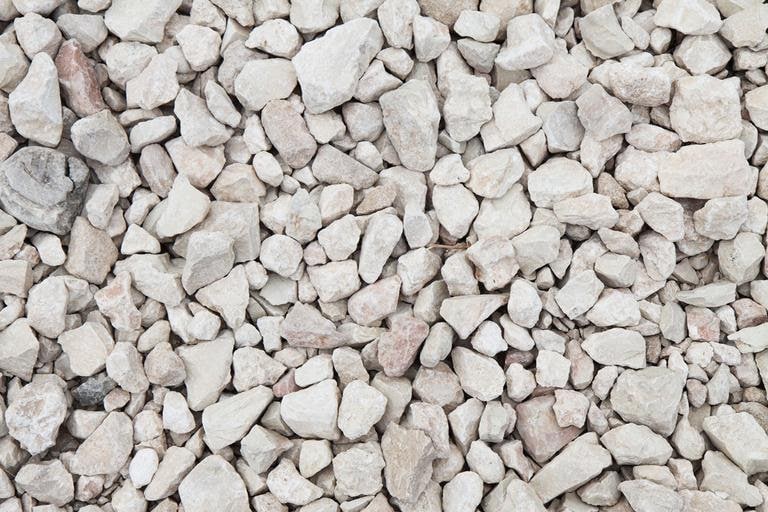
There isn’t a lot of variety for the bottom layers of a gravel driveway, however, there are more options when it comes to finding the best gravel for driveway surfaces. Among the other options are crushed stone #411, quarry process, pea gravel, jersey shore gravel, marble chips, and river rock. These are the best options for driveway surfaces gravel, because they are small stones combined with rock dust, which makes a more solid driving surface.
1. Crushed Stone #411
It is crushed up #57 stone combined with rock dust. This mixture is able to handle moderate traffic from heavy vehicles.
2. Quarry Process
It is also called “crusher run” and works well for the surface of both driveways and walkways. It’s made from stone dust fines and crushed stone.
The stone dust will settle and become compact to create a semisolid surface that is smooth. It is important that you know that this type of surface gravel needs to be sloped towards the sides of your driveway for better drainage.
3. Pea Gravel
Pea gravel is popular gravel for driveway aesthetics. It’s made up of round, small stones that can come in many different colors. This type of gravel will easily migrate and spread under the weight of vehicles, though, and needs to be stabilized for long-term, maintenance-free usage.
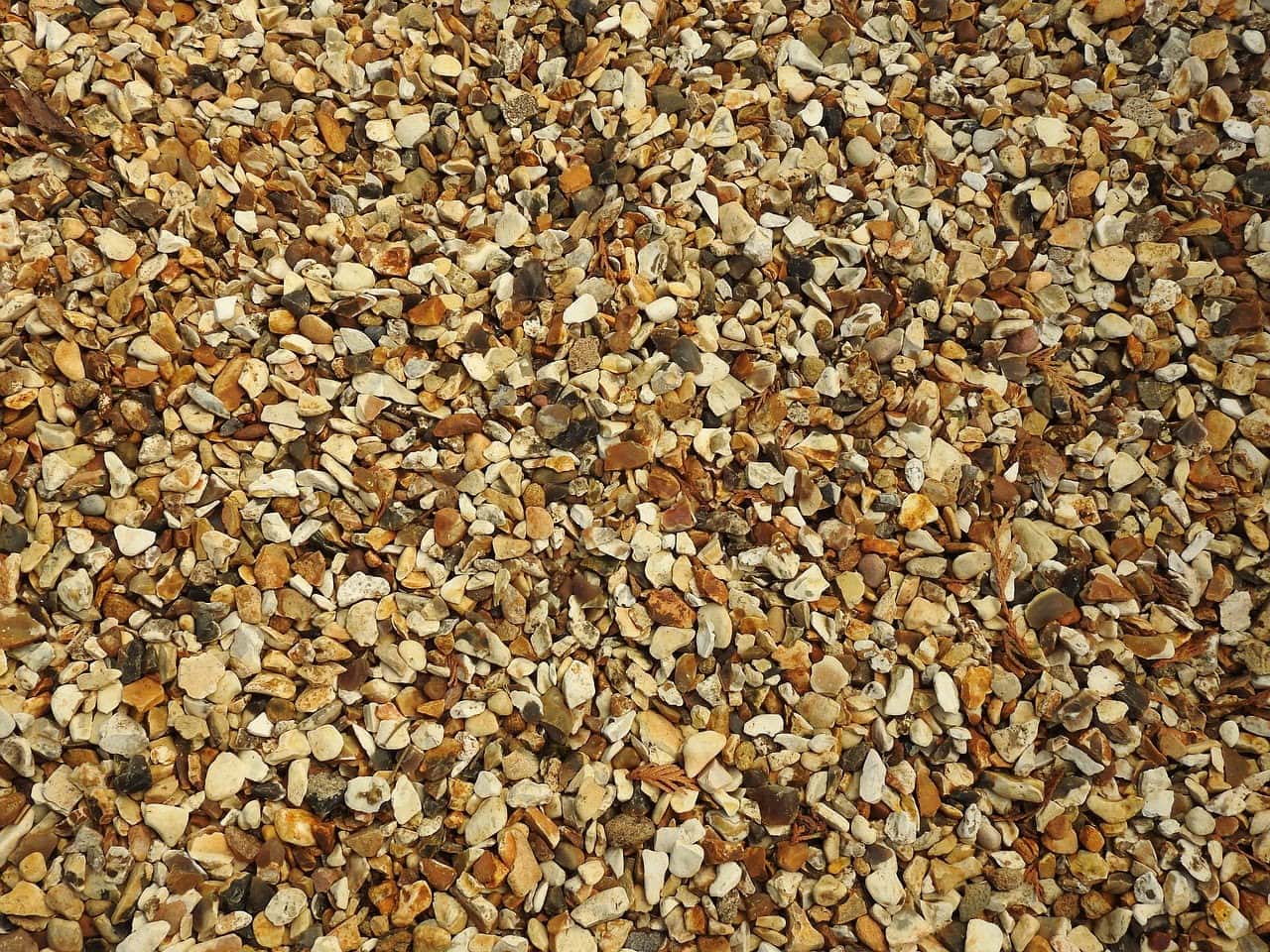
4. Jersey Shore Gravel
It is made of yellow, tan, white, gold, and brownstones and looks quite a bit like sand. It’s similar to pea gravel since it needs borders or stabilizing pavers to prevent it from spreading.
5. Marble Chips
Marble chips are white and they sparkle in the sunlight. They typically cost more than other gravel types but are another favorite when it comes to being the best gravel for driveway aesthetic appeal. This type of gravel also needs a border or stabilization to prevent it from spreading, migrating, and washing away.
6. Blackstar or Blacktrap Rock
A very attractive dark gray gravel, this is an excellent choice as it is angular and locks together. When combined with stabilizing grid paving system, this provides a super durable and beautiful driveway.
A Better Alternative to Typical Gravel Driveways
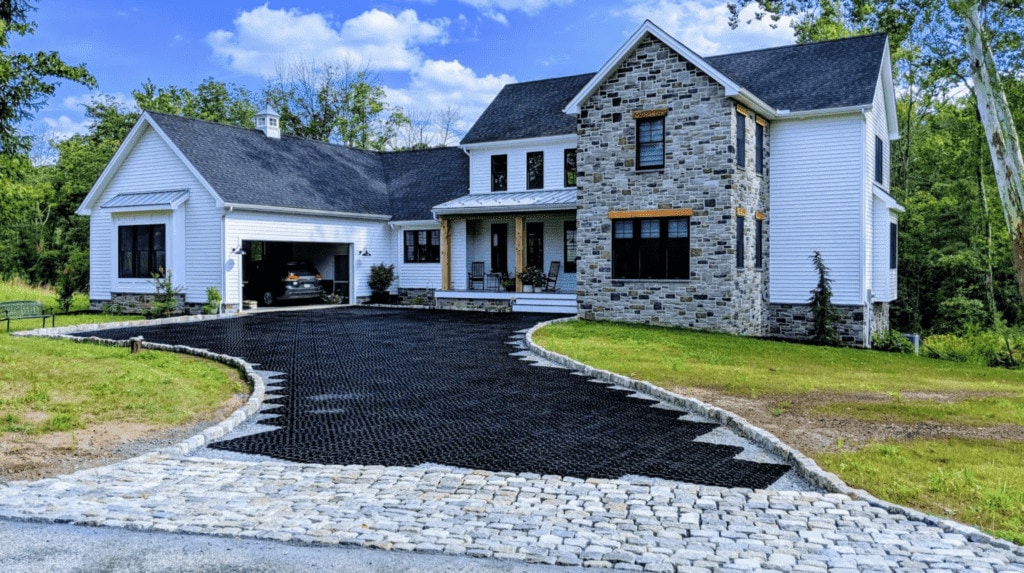
Some of the aforementioned gravel types require stabilization, but the best way to construct any gravel driveway is by using TRUEGRID permeable pavers to lock in your gravel.
TRUEGRID PRO LITE and PRO PLUS stabilizing pavers simply require fill gravel and surface gravel, although you can use the same type of gravel for both. The fill gravel is poured over the top of a piece of fabric at the bottom of the excavated area where you want your driveway that provides drainage for water and other liquids.
It is then compacted and leveled before TRUEGRID permeable pavers are snapped in place over the surface. Next, your surface gravel of choice is poured over the pavers and locked into place using a heavy roller or vehicle. This weighs the pavers down and locks them securely into place.
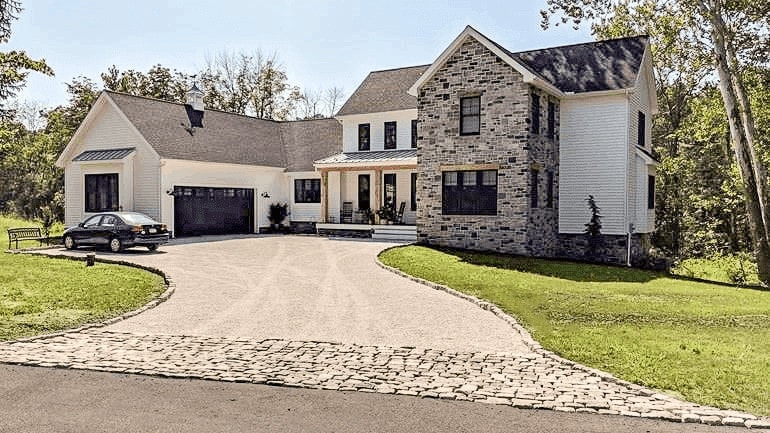
The main benefit of using TRUEGRID pavers to build a gravel driveway is that they will keep your gravel in place, eliminating the need for almost any maintenance during the course of your driveway’s lifetime.
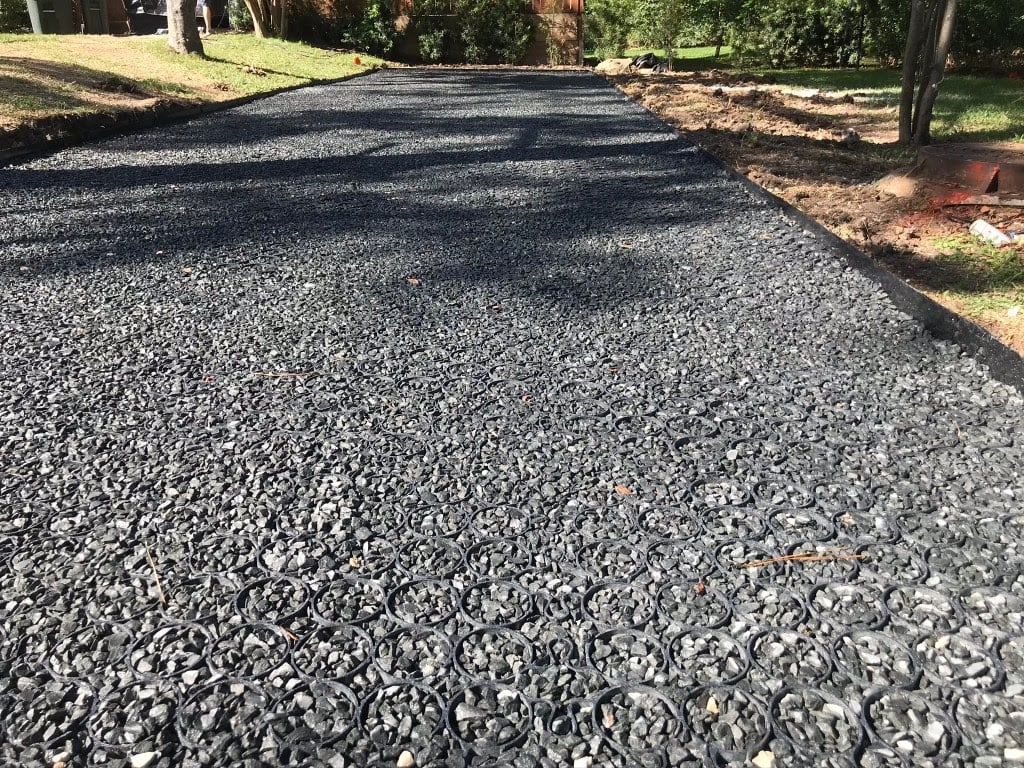
A properly installed and maintained TRUEGRID gravel driveway is durable enough to handle all types of vehicle traffic and will last up to 60 years without cracking or breaking down in the sun, rain, or other types of weather like asphalt does.. Choosing the best gravel for driveway usage is only part of the equation.
If you want to build your gravel driveway the maintenance-free way, get in touch with the pavement professionals at TRUEGRID today for a quote.
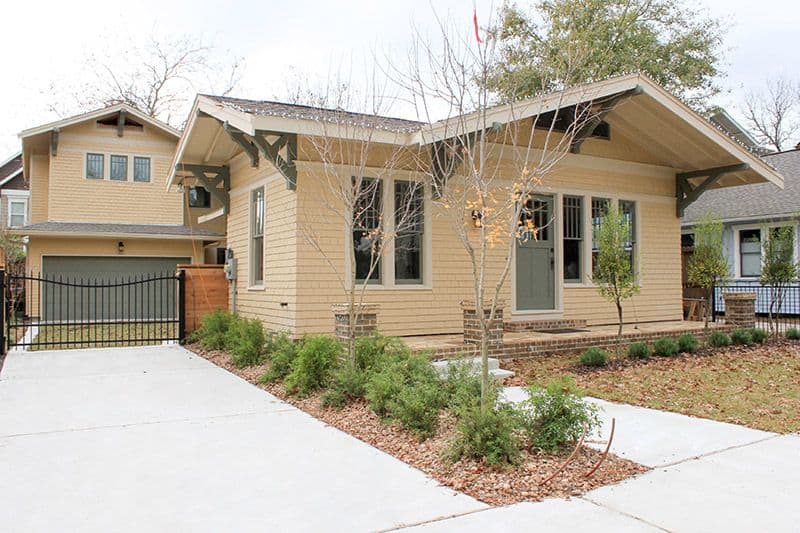
Asphalt and concrete driveways are the two most common types of driveways in America. From sprawling suburban areas to rural homes and country roads, it’s not uncommon to drive for miles without ever seeing a different type of driveway. But have you ever wondered how concrete and asphalt stack up against each other? Driveway performance is measured via a number of different factors and characteristics, some of which you might not have thought to take into consideration.
In case you’re looking to install a new driveway or update your old one, let’s have a look at how asphalt and concrete compare, as well as what other options might be available to you.
All About Asphalt
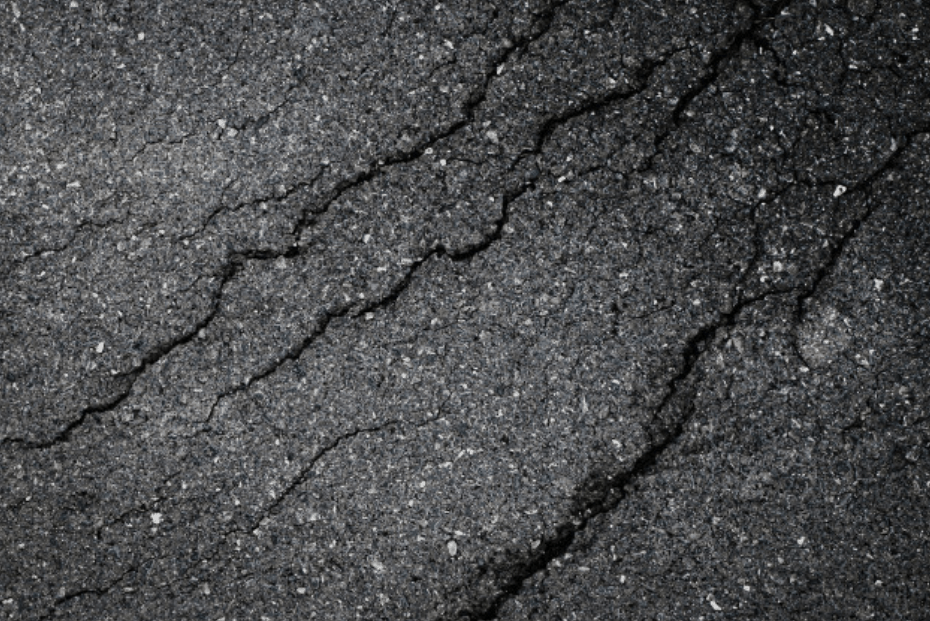
Asphalt is a black, tar-like substance that dries and hardens into a drivable surface. One of the main benefits of asphalt over concrete is that it cures faster than concrete does. It also happens to be less expensive and works very well in cold climates.
Hot climates and asphalt do not mesh well because the tar tends to get a bit hot and sticky in high temperatures. This can leave residue on your tires and even your shoes as well, and would not feel very good on your bare feet. It’s also easier to remove ice from asphalt than concrete. Asphalt does tend to develop cracks over time but the repair-job for that is seamless, and it just requires quick resurfacing if it gets too bad.
Some of the drawbacks of asphalt include the fact that you’re very stylistically limited when it comes to asphalt driveways. In fact, your only option is pretty much black. The edges on an asphalt driveway will also not be as straight, and it needs to be properly sealed to keep its durability. Asphalt is less durable than concrete, overall.
Concrete Considerations
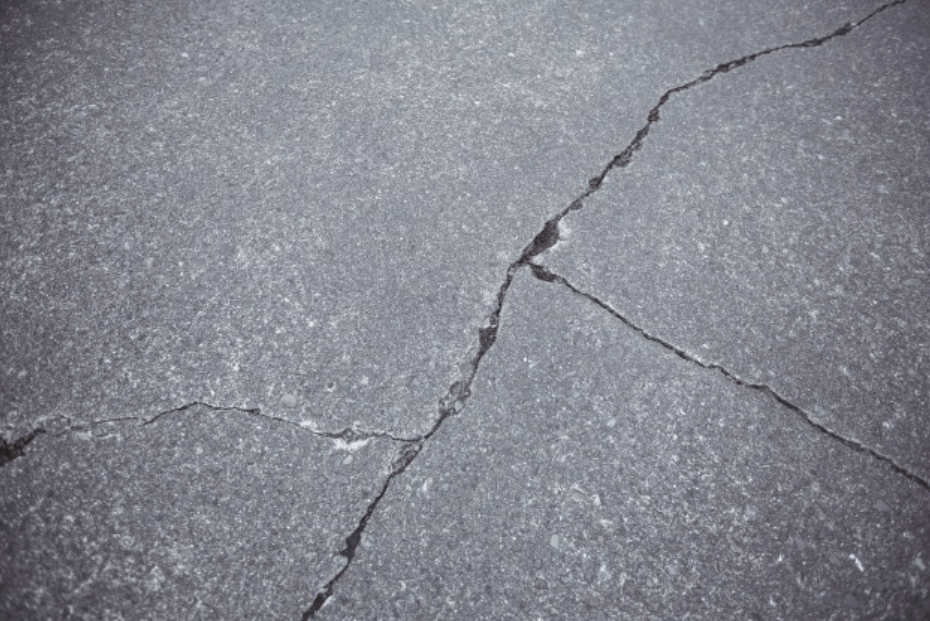
Concrete has a variety of benefits that asphalt does not possess, but also has some drawbacks as well. Concrete is more flexible when it comes to design and color, allowing you to get a bit more creative with your install. It also comes out with neater, straighter edges than asphalt and is more durable as well.
Concrete is good for hot-weather conditions but will easily crack in cold weather. Concrete stains and discolors from automobile fluids that drip from our vehicles and become ugly over time. Salt and de-icers will damage a concrete driveway and concrete will hold a stain much more noticeably.
Concrete is also more expensive than asphalt and it cannot be resurfaced. Crack repair is also quite a bit more obvious in concrete than it is in asphalt.
Assessing Alternatives
If you’ve gone over the pros and cons of both concrete and asphalt but haven’t been swayed by either type of material, you might want to consider the alternatives. Although asphalt and concrete are the most common type of driveways, there are other options gaining steam rather quickly in the construction industry. Permeable pavers, for example, are taking the world by storm.
Permeable pavers, like the kind produced by TRUEGRID and others are the best alternative to asphalt and concrete driveways for several reasons. They offer just as much, if not more, stylistic variety than concrete and asphalt. With different colored aggregates to choose from, you can mix and match your favorite types of stones until you’ve got the ideal color pairing. You can also get really creative with the actual driveway design, and you can even create hidden driveways that lay beneath your lawn.
The installation time for a permeable paver driveway is approximately one day, and can even be done as a DIY project if you have a heavy vehicle around to compact the aggregate. Permeable pavers are made from 100% recycled plastic and allow water to pass directly through them into the soil below. This makes them the most eco-friendly type of driveway material by far and provides extra drainage to protect your home. TRUEGRID making sure everything from production to installation is as eco-friendly as possible.
Permeable pavers are more cost-effective than asphalt or concrete, with the upfront cost being lower as well as the maintenance needs. They are incredibly durable and will last longer than concrete or asphalt.
TRUEGRID Has the Best Driveway Alternatives to Concrete and Asphalt
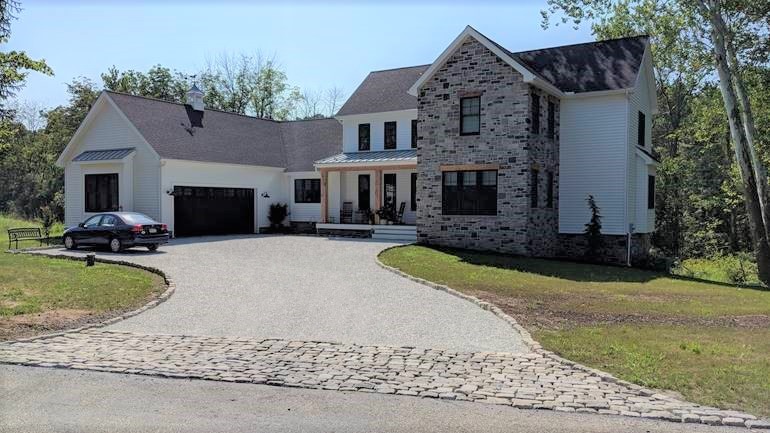
If you’re ready to move on from your standard concrete or asphalt driveway, consider using TRUEGRID permeable pavers. They perform admirably in all facets of driveway performance and are much better for the environment as well as more cost-effective for you.
They also stand up well in both hot and cold weather, and can even eliminate any driveway flooding or erosion problems you have. When it comes to the perfect combination of aesthetic beauty, durability, cost-effectiveness, and overall performance, TRUEGRID’s permeable pavers can’t be beat.

